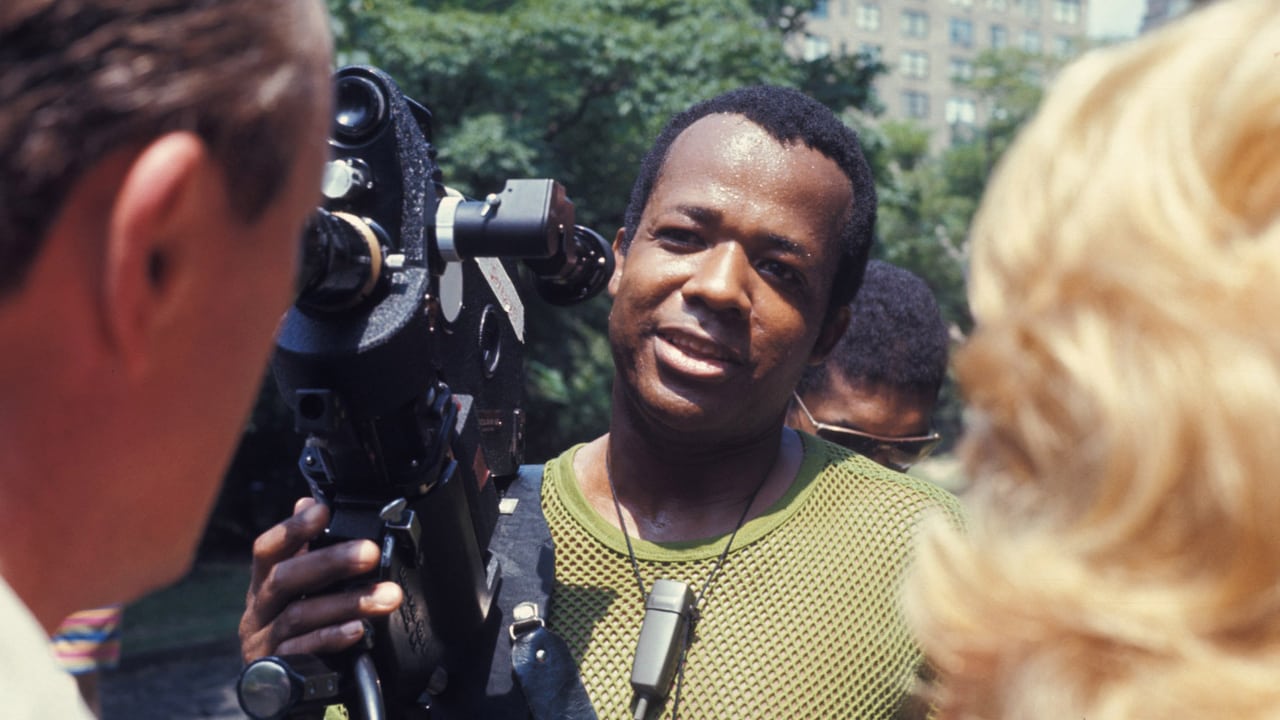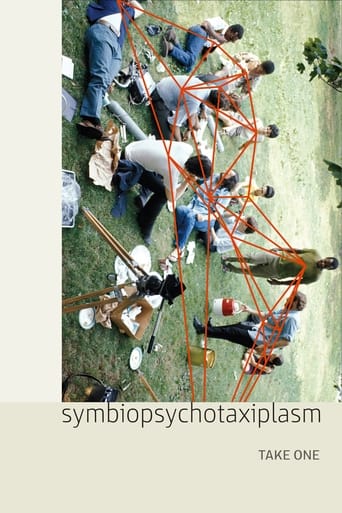SpuffyWeb
Sadly Over-hyped
WillSushyMedia
This movie was so-so. It had it's moments, but wasn't the greatest.
Brennan Camacho
Mostly, the movie is committed to the value of a good time.
Anoushka Slater
While it doesn't offer any answers, it both thrills and makes you think.
TonyKissCastillo
......................................................from Pasto,Colombia...Via: L.A. CA...and ORLANDO, FL After my first viewing: Total shock! Upon some reflection, I didn't feel I was ready to write a review, so I watched the Special Features segment on William Greaves (At 1 hour, almost as long as the film) and then watched SYMBIO again. Here's the comment I was going to use after viewing once: "Is it an extremely original concept in film-making? Yes, undoubtedly! Is it enjoyable and watchable? For me, at least, the answer to that is 'Not so much' 7*" Just how stupid am I, anyway? (Rhetorical question, that!)Here I am, nearly 66 years old, yet it wasn't till yesterday that I became aware of William Greaves! Can't remember the last time I could look anyone and everyone in the eye and say the words, with soulful and unabashed conviction: "GENIUS! Pure, Unadulterated GENIUS!" Sitting here at my computer, focusing on authoring this review, the SYMBIO-experience has inspired me to an extent unparalleled by any other film in recent years. My job now: Articulate this in a way that, in turn, will inspire you to watch and perhaps produce a review of your own. Here, perhaps the most challenging aspect of review-writing is to avoid anything resembling a spoiler. Don't read the Blurbs. One definitely contains a spoiler, which could easily deprive you of the joy of "Getting It" all on your own! The two things which stand out most in retrospect? First, the sheer simplicity of the applied concept itself is truly inspirational, in and of itself. Second, that it took a 1/4 of a century, after the fact, for Mr. Greaves to get a decent screening and begin to get some of the recognition he so sorely deserved for this cinematic milestone.Couldn't help but notice that SYMBIO-was shot in August 1968, just a few months after the release of Stanley Kubrick's 2001. What do both films have in common? Well, thematically, not much, really. But it's hard to imagine someone like Greaves not having seen it soon after its release, so...Who knows? We could always ask him!10*.....ENJOY/DISFRUTELA! Any comments, questions or observations, in English o en Español, are most welcome!
Michael_Elliott
Symbiopsychotaxiplasm: Take One (1968) *** (out of 4) Incredibly fascinating little gem from director William Greaves works as a feature film but also a documentary. Basically what we have here is Greaves shooting an actual feature dealing with a husband and wife fighting about their life while walking through Central Park. That's the "feature" side of things. While they're shooting this they also have two separate cameras picking up all the drama and action going on in real life. So, the film is one where we get to see the actual feature being shot but also a documentary covering the making of the actual movie. I can't say I had ever heard of this movie before it popped up on Turner Classic Movies but part of what makes being an open-minded film buff so great is that you often come across gems that you might not have had you simply didn't expand in your viewing habits. It's really hard to explain this feature or why it works so well but I found it to be rather fascinating because there are moments where we get a third aspect of the "film" which is when the production crew are gathered in a room where they discuss where the film should go and their opinions on whether or not Greaves is doing a good job directing. These three aspects of a "film" are so interesting that you have to wonder why someone didn't try doing a picture like this a lot earlier and while there are certainly some creaky moments, overall this is a rather genius thing to try and pull off and you really can't help but applaud the director. There are some very funny moments in the behind-the-scenes section including a bit where they're filming and a group of people gather to watch and the director has to explain to them what they're doing and why they need to be quiet so that they don't ruin the scene. There are other moments where the crew fight about how much film is left, there's a sequence with a cop wanting to see some permits and then of course there's the actual film being shot, which contains a couple actors who are very good in their parts. It's also interesting to see the actors playing their parts and coming up with ideas to run past the director. I think what I really pulled away from this movie, unlike any other documentary, is how everyone working on a film thinks they're the most important part. The actors are focused on their job. The director has his job. The crew have their job and everyone is so focused on what they're doing that it's hard to really see what the other person's job is and why it might be just as important. This movie certainly isn't for everyone but those who enjoy movies about making movies should find themselves entertained.
whereismikeyfl
Symbiopsychotaxiplasm points the way toward so many later development in film. It manipulates reality by provoking the hapless cast, crew and bystanders to play roles by provoking them. The director of the film uses his own behavior as a Rorschach test. The whole genre of reality television as well as avant-garde documentary styles are anticipated in this film.In addition to its historical importance the film is fascinating on its own terms for anyone who likes to think about the nature of performance vs. reality. Gender, race, sexuality and the march of time also make appearances. Criterion has done its usual terrific job in rescuing this forgotten masterpiece from undeserved obscurity.
sethhmartin
It would be hard to put a numerical rating on this movie, as it is essentially a movie created inside out, with the `action' being performed by the `actors' as the hard nut on the inside, and the more free-flowing production process as the body of the film – this process being captured on several 35mm cameras rolling continually -- on the outside. Not to say there is nothing important about the `action,' which centers on an arguing couple in Central Park – in fact, there is a certain anarchy of purpose in the two characters' criticism of each other (using pithy, well-worn movie expressions) that mirrors a knowing anarchy in the production loosely watched over by Greaves. The film is open-ended, suggesting that the production process will continue even after the `failure' of more than one pair of actors to claim their roles for themselves. There is something about Symbiopsychotaxiplasm that suggests failure, whether it's the suspicion of the crew that Greaves lacks direction, or the sort of floundering behavior of the actors when they are not reading their lines. But that too is part of Greaves vision. Early on in the film one of the production staff laments Greaves' opacity, saying that the director tends to answer questions with very vague statements that make one wish they hadn't asked the question in the first place. It is this mysteriousness within Greaves (`what is he doing?') that gives the film its skeleton, and makes it much more than simply a Happening in the Park.

